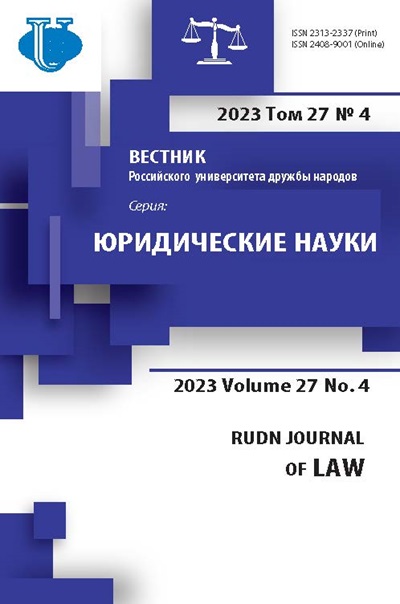Новые технологии в праве как высокоэффективное средство реализации конституционного принципа равенства в условиях разноуровневого правового регулирования
- Авторы: Исаков И.Н.1
-
Учреждения:
- Московский институт электронной техники
- Выпуск: Том 27, № 4 (2023)
- Страницы: 919-938
- Раздел: КОНСТИТУЦИОННОЕ И МУНИЦИПАЛЬНОЕ ПРАВО
- URL: https://journals.rudn.ru/law/article/view/36895
- DOI: https://doi.org/10.22363/2313-2337-2023-27-4-919-938
- EDN: https://elibrary.ru/GAWEEV
- ID: 36895
Цитировать
Полный текст
Аннотация
Актуальность исследования обусловлена значительным усложнением общественных отношений, высоким их динамизмом, стремительным ростом новых высоких технологий в развитии современного права, его ориентированностью на реализацию конституционного принципа равенства. Предпринята попытка обосновать, что социальная направленность Российского государства и применение новых высоких технологий в праве дают возможность нормам первичного регулирования более активно участвовать в расширении круга субъектов, наделенных правом принятия норм первичного регулирования, в результате чего правовое регулирование необходимо приобретает разноуровневый характер, а высокотехнологичное право, благодаря новым свойствам (технологичность, логистичность, наукоемкость) выступает эффективным средством осуществления принципа равенства в конкретных правоотношениях. Целью работы является обоснование роли высоких технологий в качестве эффективного средства реализации конституционного принципа равенства в условиях разноуровневого правового регулирования. Материалами для проведения исследования послужили труды ученых-юристов, а также специалистов в области философии, теории права, социологии, технологии, юридическая практика, нормативная правовая база федерального, регионального, муниципального и локального уровней, практический опыт работы автора в правоохранительной сфере и преподавательской деятельности. Выводы получены на основе общенаучных методов исследования: диалектического, системного, логического, социологического, а также частно-научных и специальных методов. Обосновано, что новые высокие технологии в праве существенно корректируют основные теоретические установки первичного правового регулирования, его парадигмы и практическую направленность, развивают идею разноуровневого и интегративного характера правового регулирования. Дается авторская интерпретация понятиям «равенство», «разноуровневое правовое регулирование». Раскрываются механизмы действия высоких технологий в реализации правового равенства. Показаны позитивные результаты применения в разноуровневом правовом регулировании цифрового государственного управления, искусственного интеллекта, электронного правительства и др.
Об авторах
Игорь Николаевич Исаков
Московский институт электронной техники
Автор, ответственный за переписку.
Email: isakov2009@yandex.ru
ORCID iD: 0000-0001-6944-1048
кандидат юридических наук, доцент, доцент Института высокотехнологичного права, социальных и гуманитарных наук
Российская Федерация, 124498, г. Москва, г. Зеленоград, площадь Шокина, д. 1Список литературы
- Аристотель. Политика // Собр. соч. в 4 т. Т. 4. М.: Мысль, 1984. 444 c.
- Бертовский Л.В. Высокотехнологичное право: понятие, генезис и перспективы // RUDN Journal of Law. 2021. Т. 25. № 4. С. 735-749. https://doi.org/10.22363/2313-2337-2021-25-4-735-749
- Çɪnar Özgür Heval (2021) The current case law of the European Court of Human Rights on privacy: challenges in the digital age. The International Journal of Human Rights. 25(1), 26-51. https://doi.org/10.1080/13642987.2020.1747443
- Чичерин Б.Н. О народном представительстве. М.: Тип. Товарищества И.Д. Сытина, 1899. 836 с.
- Guihot M. (2019) Coherence in technology law. Law, innovation and technology. 11(2), 311-342. https://doi.org/10.1080/17579961.2019.1665792
- Кудрявцев В.Н. Равноправие и равенство: монография. Репр. изд. М.: Норма: ИНФРА-М, 2017. 184 с.
- Лунеев В.В. О равенстве и равноправии в современной России // Государство и право. 2013. № 5. С. 95-99.
- Маркс К. Дебаты шестого рейнского ландтага. Статья третья. (Дебаты по поводу закона о краже леса) // Маркс К., Энгельс Ф. Собр. соч. Т. 1. М., 1955.
- Морхат П.М. К вопросу о правосубъектности «электронного лица» // Юридические исследования. 2018. № 4. С. 1-8. https://doi.org/10.25136/2409-7136.2018.4.25647
- Нерсесянц В.С. Философия права. М.: Норма, 2005. 656 c.
- Пашенцев Д.А., Алимова Д.Р. Новации правотворчества в условиях цифровизации общественных отношений // Государство и право. 2019. № 6. C. 102-106. https://doi.org/10.31857/S013207690005265-3
- Соколов А.Ю., Солдаткина О.Л. Приоритеты правовой политики в сфере цифровизации законотворческой деятельности // RUDN Journal of Law. 2022. Т. 26. № 3. С. 705-724. https://doi.org/10.22363/2313-2337-2022-26-3-705-724
- Сырых В.М. Логические основания общей теории права: Логика правового исследования: в 2 т. Т. 2. М.: Юстицинформ, 2004. 560 c.
- Сырых В.М. Логические основания общей теории права. Современное правопонимание. Т. 3. М.: Российская академия правосудия, 2007. 512 с.
- Сырых В.М. Материалистическая теория права. Сущность права. Т. 2. М.: РАП. 2011.
- Терещенко Л.К. Реестровая модель оказания государственных и муниципальных услуг // Журнал российского права. 2021. Т. 25. № 7. С. 110-120. https://doi.org/10.12737/jrl.2021.090
- Трофимов В.В. Формирование нового российского права как социально-юридический процесс: общетеоретический и практико-ориентированный аспекты // Проблемы формирования нового российского права и новой российской государственности: на пути движения к «чистому золоту права»: сборник материалов I Всероссийской научной конференции: к юбилею профессора Н. А. Придворова, Тамбов, 5 февраля 2015 года. Тамбов: Тамбовский государственный университет имени Г.Р. Державина, 2015. С. 101-116.
- Васильев А.А., Печатнова Ю.В. Место искусственного интеллекта среди элементов состава правоотношения // Digital law journal. 2020. Т. 1. № 4. C. 74-83. https://doi.org/10.38044/2686-9136-2020-1-4-74-83
- Витрук Н.В. Права и свободы человека и гражданина в контексте реальной жизни как объект научно-правового познания // Конституционные права и свободы личности в контексте взаимодействия гражданского общества и правового государства: материалы II Международной научно-теоретической конференции. М.: РАП, 2010. С. 9-19.
- Власенко Н.А. Отклоняющееся государство: учение Аристотеля и постсоветская реальность // RUDN Journal of Law. 2021. Т. 25. № 3. С. 479-505. https://doi.org/10.22363/2313-2337-2021-25-3-479-505
- Власенко Н.А. Разумность и определенность в правовом регулировании: монография. М.: Инфра-М, ИЗиСП, 2014. 157 c.
- Ястребов О.А. Искусственный интеллект в правовом пространстве: концептуальные и теоретические подходы // Правосубъектность: общетеоретический, отраслевой и международно-правовой анализ: Сб. материалов к XII Ежегодным научным чтениям памяти С.Н. Братуся. М.: Институт законодательства и сравнительного правоведения при Правительстве РФ; Статут, 2017. С. 271-283.
- Зорькин В.Д. Конституция живет в законах. Резервы повышения качества российского законодательства // Журнал конституционного правосудия. 2015. № 3(45). С. 1-5.
Дополнительные файлы















